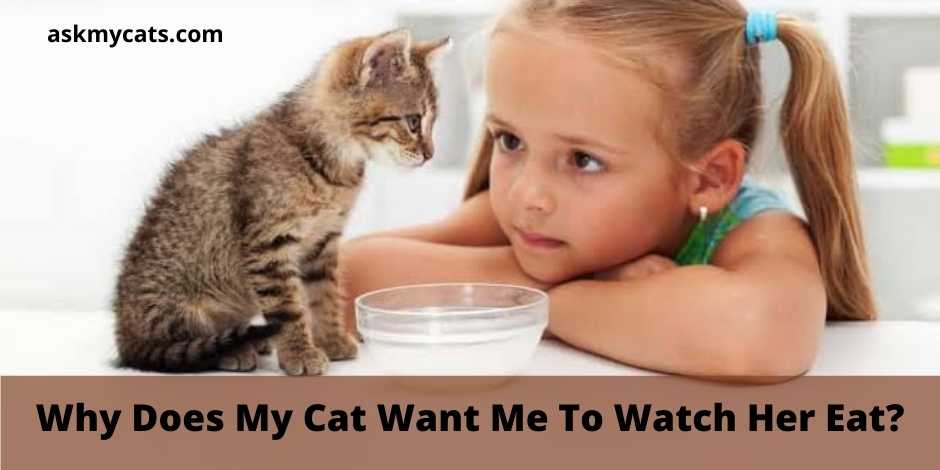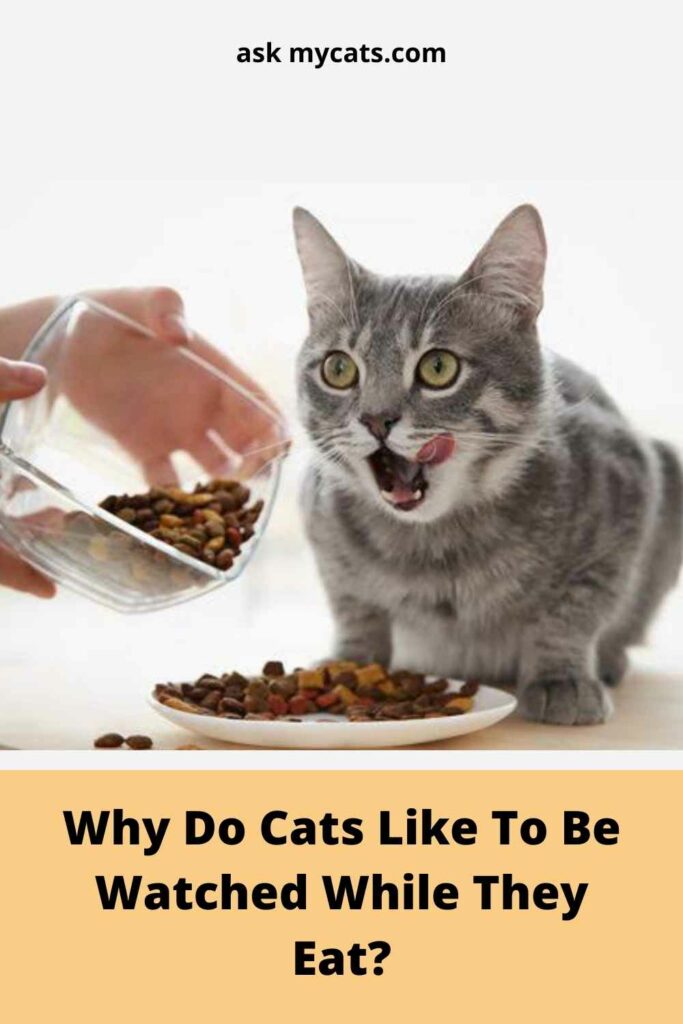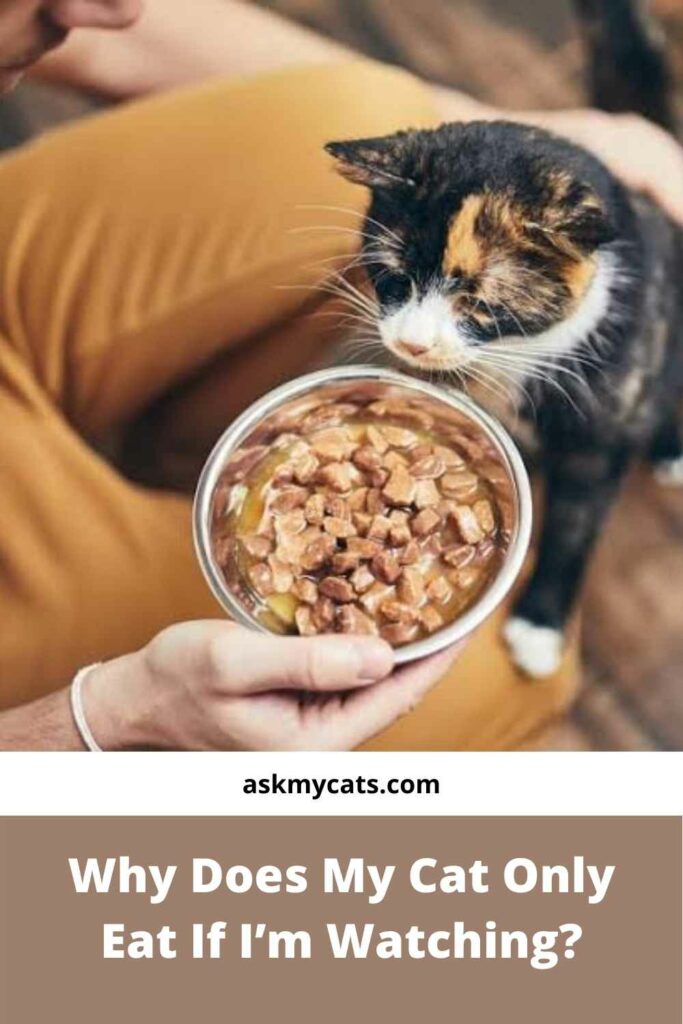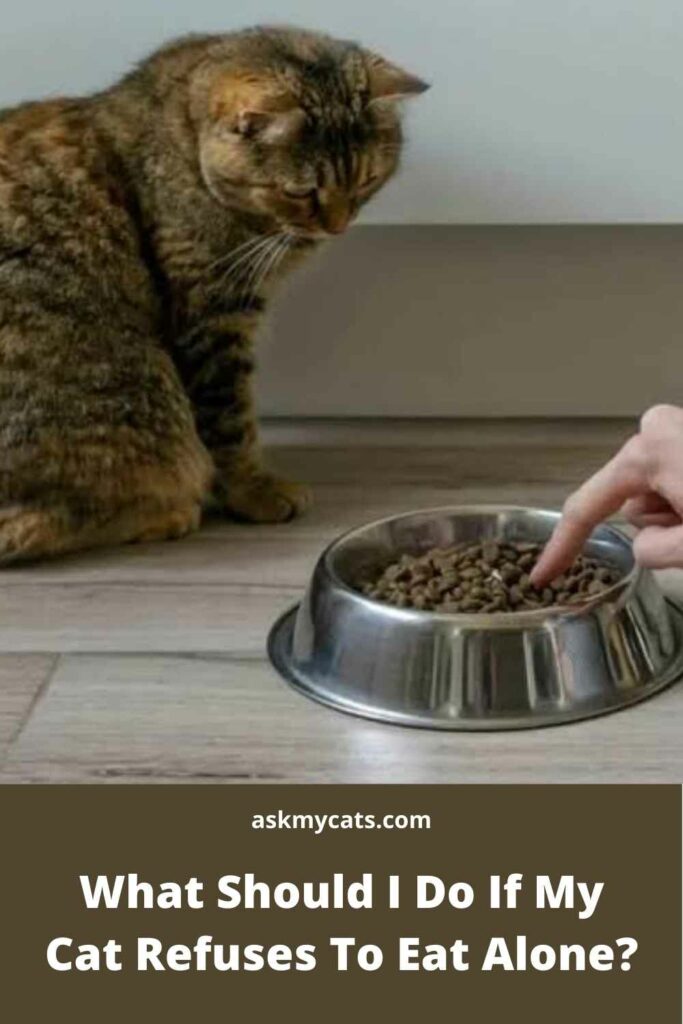Your cat wants you to watch her eat because it makes her feel comfortable and assures her that her owner is present when she eats.
Eating is a sensitive moment for cats. As they are preoccupied with eating, they are less observant of their surroundings. Skittish cats, in particular, want the presence of their owner while they are in this vulnerable state. Your cat believes you have their best interests at heart.
It is adorable that your cat wants you to watch her eat. It portrays the fact that your cat trusts you to have her back.
If you want to know more about your feline friend’s eating habits, keep reading!


Give Your Cat the Perfect Day
Get the Free Ebook!
Why Do Cats Want You To Walk Them To Their Food?
Cats may want you to walk them to their food so you can watch them eat. This habit might be caused by the cat’s desire to feel safe and protected while eating.
Many cat owners have stories of their cats leading them to their dining place and then eating as they stood there observing them. If they begin to move or become preoccupied with anything else, the cat will usually stop feeding and fetch them to their dining location.
They also want you to walk them to their meal to let you know that something is amiss, such as the food isn’t fresh. Your cat may be acting this way to get your confidence regarding their meal. If you stir your cat’s food a few times, it may typically encourage the cat to consume more food as a result.
Some cats allow their owners to pet them while they eat, although there are also cats that do not like to be touched at all while eating. Other cats want their humans to just be there as they eat, watching and talking to them in soothing voices. This just goes to show that each cat has its preferences when it comes to its eating habits.
Why Do Cats Like To Be Watched While They Eat?

Cats like being observed and stroked by their owners as they eat.
They are the most relaxed and vulnerable while eating and require their human companion to care for them and remove any potential risks or dangers while they eat.
Cats are not aware of their surroundings while eating since they are too occupied licking and chewing their food. They have faith in their owner to be present for them while they eat.
In cats, this is known as affection eating or attention-seeking. Cats that are afraid of adjusting to a new environment or who have been involved in a shocking event may want their owners to be there at all times, especially while feeding.
Cats who are affectionate eaters require the presence of their owners when eating. You may have to spoon-feed them at times.
Such cats beg to be petted or just stared at while eating. If your cat refuses to eat, bring her food bowl to your room and sit next to her while she eats. Cats trust their owners and let go of whatever inhibitions or concerns they have with them so they can eat in peace.
So, when your cat wants you to watch her eat, you know it’s because she trusts you to keep her safe even in the most vulnerable situations.
Why Does My Cat Only Eat If I’m Watching?
Your feline friend trusts you as an ally and wants you to have her back and protect her from any kind of harm while she eats.
We will now discuss the various reasons why your cat only eats while you are watching:

1. Trust
Consider being always attentive and observant of your environment, even while eating. You won’t be able to correctly swallow a single bite.
Cats are the same way. They have strong senses and are always aware of their environment.
The only time they are not conscious is when they are eating. They are quite vulnerable while feeding and as a result require the companionship of their loving human. If your cat refuses to eat while you are away, this is typically interpreted as a gesture of trust, devotion, and loyalty.
Even in a vulnerable situation, your cat trusts you. She is certain that you will protect her at all times.
2. Habit
Cats, like human newborns, develop behaviors as infants that might be difficult to break as they grow older.
Some newborn human babies, for example, establish the practice of sucking their thumbs and continue to do so as they grow older. Similarly, as freshly born kittens, cats learn the behavior of affection eating.
During their kitten days, most pet parents spoon-feed their cat or inject the food with a syringe if they are unable to swallow.
Kittens require additional attention and if you fed your cat in your lap frequently during her early months, it must have become a habit that she now maintains. As a result, she still expects your companionship while eating and wants you to keep an eye on her.
3. Fear
Even if your cat did not exhibit affectionate eating as a kitten, she may develop it as an adult. This might happen as a result of a fear or shock episode that occurred while your cat was eating, or for other reasons.
Cats are vulnerable animals and even minor incidents may have a significant influence on them causing them to fear being left alone.
Your cat can see you and follows you around all day. However, this may not be the case when she consumes her meal.
Your cat is unable to see you as she is busy concentrating on her food. This might cause panic or anxiety about being alone. As a result, your cat requires confirmation that you are present even when she is eating.
4. Illness
Pet parents treat their pets as though they are babies. When their kitten refuses to eat, the parents spoon-feed them.
In the same way, cats may lose their appetite due to illness or injury and refuse to eat their meal. In your company, she might only eat if she feels fully safe and at ease. Petting your cat’s fur while she is eating can cause her to relax and feel secure.
Interesting Read: Why Do Cats Purr While Eating?
Should You Pet A Cat While They Eat?
Your cat enjoys being petted and stroked while she is eating. Therefore, it is completely alright to pet your cat in order to assure her while she eats.
While they are eating, many cats love being caressed or touched. Cat owners and cat shelter volunteers who understand this can better care for their feline friends.
It’s possible to make a timid cat comfortable by stroking her while she’s eating. According to research, mealtime is a chance to develop a bond with a “difficult”.
While she is eating, a timid cat may allow you to approach. If a cat is easily overstimulated, for example, if she bites or scratches when you pet her, you may be able to desensitize her to touch by gradually increasing petting time while she feeds.
Why Does My Cat Eat When I Eat?
Cats who appear to eat better when they are in the company of humans are referred to be “affection eaters.”
They may just prefer someone to sit with them as they eat, while others love being petted or require additional incentive to eat, such as having food delivered close to them, hearing their kibble dish rattle, or even being spoon-fed.
Affection eaters are often responding to a frightening new environment and the loss of their former home and/or human friends in the same manner that stress causes humans to lose their appetite.
Most occurrences of “affection eating” are caused by stress and are not a medical issue. However, stress-related anorexia (not eating) in cats can swiftly escalate into a medical emergency and be fatal. Therefore, it is advised that you consult a veterinarian if your cat stops eating.
Why Do Cats Want You To Touch Their Food?
Your cats may want you to touch their food in order for you to assure them that it is completely safe for them to eat. If you stir your cat’s food a few times, it may encourage them to eat.
Walk your cat to her food and watch and protect her as she eats her meals. She may want you to touch her food to remind you that she wants new food or to get your assurance that her food is there.
There is nothing to be concerned about this quirky behavior of cats. Some cats are just affectionate eaters and demand attention and care while they eat.
What Should I Do If My Cat Refuses To Eat Alone?

While many experts accept that cats prefer their owners to watch them eat, it is critical to ensure that you are not rewarding harmful behavior. On the surface, it may appear that this practice has no detrimental influence on your cat’s health or nutrition.
However, whether you go on vacation or are away from home for whatever reason, this reliance might cause emotional tension.
If you are gone for an extended period of time, your cat may go into a lengthy fast because they are too stressed to eat. Due to a lack of nourishment, they may end up vomiting bile.
If they fast for an extended period of time, this inflammation can develop into ulcers or other gastrointestinal problems, which can have a negative impact on their health.
Try to follow these steps in order to help your cat eat during your absence:
- First and foremost, be patient since altering a cat’s behaviors is never simple. To assist your cat break this behavior, move their eating bowl to a new location in the house. It is essential to select a clean, safe, and well-conditioned setting so that the cat feels secure during feeding. It should also be far enough away from their litter box and water supply.
- Stay out of the same room while they eat. The objective is to gradually teach the cat that they do not need your presence to eat.
- You can move on to the next stage if you see your cat is comfortable enough to feed alone in a certain room. Place their favorite food in their feeder (in the newly designated room) and then leave the house for some time. This should encourage them to eat even when you are not around.
- Offering them paté or wet food can assist persuade them to eat, possibly putting their anxieties aside in favor of some tasty treat. Cats in the wild consume their food alive, which means they frequently have the same body temperature between 36.5 ºC and 38 ºC. Warming the food gradually before serving it to your pet may encourage them to eat.
If this process is not effective, it is recommended to seek the advice of a feline specialist or ethologist. As previously said, each feline is an individual with its own personality. This is why seeing a specialist may be beneficial in addressing your cat’s anxiety in a more comprehensive and holistic manner.
Frequently Asked Questions
Why Does My Cat Want Me To Walk Her To The Food?
Cats may want you to walk them to their food so you can watch them eat. This habit might be caused by the cat’s desire to feel safe and protected when eating.
Does My Cat Like Being Stroked While Eating?
Many cats enjoy being stroked or petted by their owners while they eat as it gives them assurance and a feeling of safety.
What Is Affection Eating In Cats?
Cats who seem to eat better when they have human company are called “affection eaters. Such cats demand to be caressed or simply looked at while having their meal.
Final Words
In conclusion, we can say that your cat’s need for you stems from them trusting you and having their back. You’re an ally to them.
Cats have their own peculiarities and routines when it comes to wanting your attention, bonding with you and other pets, and feeding time. It is normal for them to demand attention while they eat.
However, if you feel that your cat’s peculiar eating habits may be detrimental to her health, we suggest you consult a veterinarian.
If you’ve got any other queries regarding your feline friend, feel free to ask them in the comment section below!
